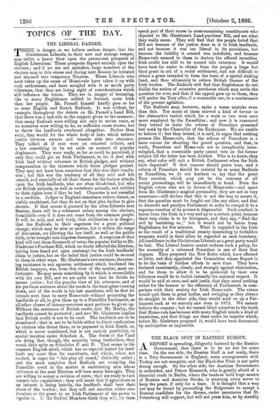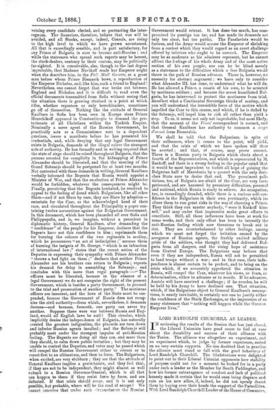THE BLACK SPOT IN EASTERN EUROPE.
AREPORT is spreading, diligently fostered by the Russian Government, that there is to be no war for some time. On the one side, the Russian Staff is not ready, there is a Tory Government in England, some arrangements with Turkey are not complete, and the Black-Sea Fleet is not quite strong enough. On the other side, the Austrian Government is undecided, and Prince Bismarck, who is greatly afraid of a financial crash in Berlin, where the bankers hold huge masses of Russian and Austrian Stocks, is straining every nerve to keep the peace, if only for a time. It is thought that a way out may be found by persuading the Bulgarians to accept a Russian candidate for the throne, under assurances that St. Petersburg will support, but will not press him, or by steadily vetoing every candidate elected, and so protracting the inter- regnum. The financiers, therefore, believe that war will be avoided, and all Stocks, except, indeed, Consols, are rising to the high level to which we have grown accustomed. All that is exceedingly sensible, and in part satisfactory, for any Prince of Bulgaria is sure to become anti-Russian ; and while the statesmen who spread such reports may be honest, the stock-dealers, contrary to their custom, may be politically far-sighted. It is conceivable, also, though to the last degree improbable, that Madame Novikoff reads her Emperor aright when she describes him, in the Pall Mall Gazette, as a great man before whom Prince Bismarck bows,•a reproduction of the Emperor Nicholas, and, like him, such a friend to England ! Nevertheless, one cannot forget that war broke out between England and Nicholas, and it is difficult to read even the official documents transmitted from Sofia without seeing that the situation there is growing strained to a point at which rifles, whether repeaters or only breechloaders, sometimes go off of themselves. Nothing like the attitude of General Kaulbars in Sofia has been seen in Europe since Prince Menschikoff appeared in Constantinople to demand the pro- tectorate of all Christians within the Turkish Empire. Nominally a mere agent of the Russian Government, he practically acts as a Commissioner sent to a dependent province, issues a manifesto before he has presented his credentials, and, while denying that any legal Government exists in Bulgaria, demands of the illegal rulers the strongest acts of authority. He has formally and in writing required that the state of siege should be raised throughout Bulgaria, that the persons arrested for complicity in the kidnapping of Prince Alexander should be liberated, and that the meeting of the Grand Sobranje should be postponed for at least two months. Not contented with these demands in writing, General Kaulbars verbally informed the Regents that Russia would appoint a Minister of War, and that the re-election of Prince Alexander would be forbidden, whatever the consequences might be. Finally, perceiving that the Regents hesitated, he resolved to appeal to the feeling of dread which Bulgarians, like all other Slays—and if not Slays by race, they are Slays by adoption— entertain for the Czar, as the acknowledged head of their race, and circulated throughout the Principality a paper con- taining twelve accusations against the Bulgarian Government. In this document, which has been placarded all over Sofia and Philippopolis, and is, we imagine, without a precedent in diplomatic history, General Kaulbars, after demanding the " confidence" of the people for his Emperor, declares that the Regents have not this confidence in him ; reprimands them for burning the colours of the two regiments in mutiny, which he pronounces " an act of indiscipline ;" accuses them of burning the insignia of St. George, " which is an infraction of international law ;" states that the recent action of the Deputies in expressing their sympathy with Prince Alexander " throws a bad light on them ;" declares that neither Prince Alexander nor his brothers can return to Bulgaria ; repeats his demand for delay in assembling the Sobranje ; and concludes with this more than regal paragraph :—" The officers must be liberated, because in the absence of a legal Government we do not recognise the right of the present Government, which is besides a party Government, to proceed to the trial and prosecution of another party." The mutinous officers are innocent, and the laws of the State must be sus- pended, because the Government of Russia does not recog- nise the civil authority—from which, nevertheless, it demands decrees—and because, forsooth, one party can never try another. Suppose there were war between Russia and Eng- land, would all English laws be null ? This circular, which implicitly denies the independence of Bulgaria, has naturally created the greatest indignation, the placards are torn down and inferior Russian agents insulted ; and the Sobranje will probably meet under the strongest impulse of anti-Russian feeling. The Regents are doing all they can, and more than they should, to calm down public irritation ; but they may be unable to control the Deputies, and votes may be passed which will compel the Russian Government either to retreat or to resort first to an ultimatum, and then to force. The Bulgarians, when excited, are very stubborn ; they see that the attitude of General Kaulbars implies a protectorate, and they feel tliat, if they are not to be independent, they might almost as well submit to a Russian Governor-General, which is all that can happen to them if they resist force by force, and are defeated. If that crisis should occur, and it is not only possible, but probable, where will be the road of escape ? We cannot conceive that under such nircumstances the Russian Government would retreat. It has done too much, has com- promised its prestige too far, and has made its demands not only too clear, but too public. The Panslavists would be furious, and the Army would accuse the Emperor of shrinking from a contest which they would regard as an overt challenge offered by inferiors who ought to be coerced. The Emperor may be as moderate as his admirers represent, but he cannot affront the feelings of his whole Army and of the most active section of his own people, nor can he be blind merely as a statesman to the difficulties which a free Bulgaria would throw in the path of Russian advance. There is, however, no necessity for abstract argument ; we have only to consider what Alexander III. has done, to understand what he will do. He has allowed a Prince, a cousin of his own, to be arrested by mutinous soldiers ; and because the arrest humiliated Bul- garia, he has intervened to protect the mutineers from trial. Recollect what a Continental Sovereign thinks of mutiny, and you will understand the irresistible force of the motive which impelled the Czar to this course, and which, if he is defied by the Sobranje, will impel him to risk all rather than yield a step. To us, it seems not only not improbable, but most likely, that the account of the Times' correspondent is correct, and that General Kaulbars has authority to summon a corps d'arine'e from Bessarabia.
We shall be told that the Bulgarians, in spite of their sullenness, when it comes to the point, will yield, and that the crisis of which we have spoken will thus be averted ; and that, of course, may prove correct. There is a Russian party in Bulgaria which elects about a fourth of the Representatives, and which is represented by M. Zankoff, and there is a strong feeling in the popular mind that it would be moat imprudent to forfeit all hope of gaining the Bulgarian half of Macedonia by a quarrel with the only first- class State sure to desire that end. The prominent poli- ticians, too, of Bulgaria are afraid of the Czar, are very inex- perienced, and are harassed by pecuniary difficulties, personal and national, which Russia is ready to relieve. An occupation, too, is exceedingly dreaded, while there is a curious self-con- fidence in the Bulgarians in their own pertinacity, which in- clines them to run great risks in the way of choosing a Prince. They think they can master anybody, " were it Katkoff him- self," and may under that impression make great efforts to conciliate. Still, all these influences have been at work for• some weeks, and their only effect has been to intensify the anti-Russian feeling which now threatens to break out in riot. They are counterbalanced by other feelings, among which we must not forget the irritation caused by the arrogance of Russian agents, the freshly excited military pride of the soldiers, who thought they had delivered Bul- garia from all dangers, and the rising hope of assistance- from Central Europe. The Bulgarians may believe that even if they are independent, Russia will not be permitted• to land troops without a war ; and in that case, their inde- pendence is almost certain to be perfect, and to bring on the- crisis which, if we accurately apprehend the situation in Russia, will compel the Czar, whatever his views, or fears, or determination, either to advance or to recede. If he advances, Austria will have received a challenge ; if he recedes, he will be held by his Army to have declined one. That situation, which, if the Bulgarians object to General Kaulbars's assump- tions, is nearly inevitable, is certainly not one to justify either the confidence of the Stock Exchanges, or the impression of so many statesmen that "nothing will happen while the German Emperor lives."



































 Previous page
Previous page